International Affairs
 |
 |
 |
 |
 |
 |
 |
Mapuches Yesterday & Today
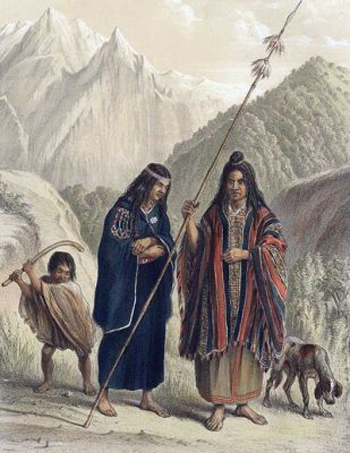
The traditional Mapuche family
was patriarchal & stable
Deep within the Mapuche soul there is an ideal that tends to order and stability, balanced with heroism and combativeness.
The Church, through the Jesuit missionaries, knew how to promote the vocation of this people. During the period of their missions (1596-1767) she gave the Mapuche people the opportunity to develop their qualities, and the missionaries obtained from the Spanish Crown laws that allowed those Indians to have a period of peace and progress.
When anti-monarchical movements rose up against Spain in the 19th century, the Mapuches supported the monarchical cause.
Historical-social background
Before the arrival of the Spanish, the Mapuche group developed around the banks of the rivers and lagoons that abound in this part of the Chilean and Argentinian territory. They established themselves in beautiful places called "aliwenes" where they celebrated their endless parties. It was a wealthy society, where courtesy and the laws of protocol helped them to maintain peace. Authority rested with the chiefs, called "lonkos", who dictated justice seated on large wooden seats under the trees. Their sentences were final.
It was a patriarchal and polygamous society, whose members were intertwined in a large network of relatives. Polygamy disappeared after the preaching of Catholic Morals, but the patriarchal element persisted. Today's revolutionary currents do everything possible to ignore it.
Arrival of the Spaniards
The arrival of the Spanish changed many things.
The Black Legend paints a picture of brutal action motivated solely by profit and greed. This is not objective. The conquerors were accompanied by missionaries, and their primary ideal was to preach the Gospel of Our Lord Jesus Christ to convert the natives and bring them to Heaven.
Despite the persistent negative portrayal of the Spanish presence in Chile and Argentina, even a progressivist historian admits that the fact that the Mapuches maintained diplomatic relations of mutual recognition with the Spaniards shows that the Crown left a better impression than the current Chilean State, which denies many of their claims.
Although there were sad abuses committed by some of the Spanish colonists, it is certainly not the whole picture.
Abuses of the encomienda system
When abuses by Spanish conquerors or colonists would occur, they would spark a Mapuche uprising. The abuses conflicted with the desire of the Spanish Crown regarding its subjects in the New World and the laws that it had issued since the time of the Catholic Monarchs Fernando and Isabel.
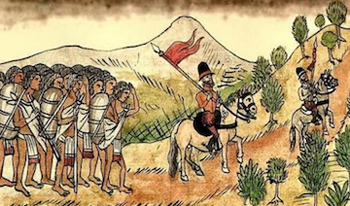
Mapuches going to work on the Spanish haciendas
To prevent such abuses the Crown regulated the relations between the Spanish and the Indians through the encomienda system. An encomienda (from the Spanish encomendar = entrust) consisted in entrusting a specific number of native Indians to a Spaniard. The recipient of the subsidy, the encomendero, could demand tribute from the Indians either in goods or labor, but, in return, he had to protect the Indians' lives, educate them and form them in the Catholic Faith.
In Chile at the beginning of the 17th century many of Indians who were not able to pay tribute in goods paid it instead in labor on the farms – haciendas – far from their villages. (Ibid, p. 5).
Jesuit evangelization
The Spanish Jesuit Padre Luis de Valdivia was committed to evangelize the indigenous people as well as to defend them against acts of hostility towards them. On February 3, 1593, he set sail from Callao with eight companions on the San Francisco galleon. They were the first Jesuit delegation sent to Chile.
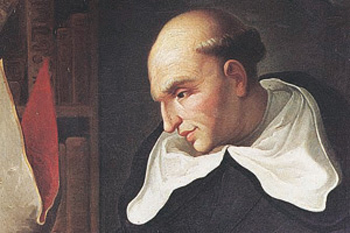
The Jesuit Luis de Valdivia
fought for the rights of the Mapuches
Valdivia traveled to Chile as a direct emissary of the King to communicate and negotiate the new conditions that would incorporate the indigenous people of this region into the Spanish Empire. From the beginning the priest had to face opposition from the governors, who finally accepted the orders of the King and his representative.
Fr. Valdivia found a good reception from the Mapuche Indians, who trusted his intentions and his companions. In 1612, he managed to gather more than 600 Mapuche representatives from 10 tribes, who signed an agreement of peace.
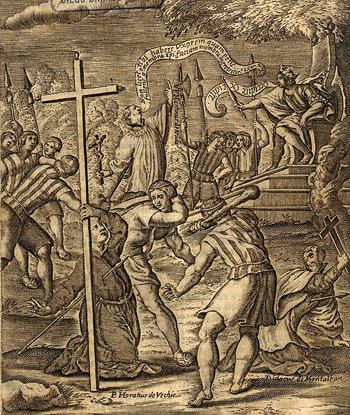
The martyrs of Elicura
This peace did not come without the blood of martyrs. During one of the infights in 1612, one of the chiefs became enraged, attacked and massacred three of the Jesuits, who became the Martyrs of Elicura.
The massacre of Elicura was on the verge of derailing the peace process initiated by Fr. Valdivia. But thanks to the work of Jesuits willing to give their lives to spread the Faith and support the Spanish Crown, the Mapuches entered a stage of peace and progress for 283 years. This was the only prosperous and stable period in their history, from the discovery of America to the present.
Mapuches today
Back then, stories of hardship, heroism and martyrdom motivated young Europeans to become missionaries after solid doctrinal training in good seminaries.
Today there is no longer an apostolate; the recruitment of young people for seminaries is carried out in classes where Marxism, Liberation Theology and diversity are studied. Of course, this formation turned toward spreading class struggle does not generate martyrs…
Instead, today the Jesuits have missions that are diametrically different from those of their spiritual ancestors. They work for the Mapuches to rebel against the governments of Chile and Argentina.
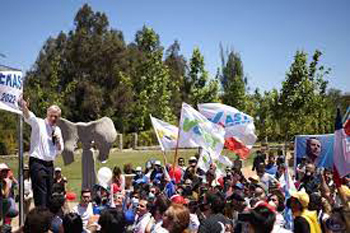
Conservative candidate Kast finds support
with the Mapuches
On November 21, the presidential and parliamentary elections were held in Chile. The supposed leadership of leftist terrorism in Chile was defeated at the national level, especially in the Mapuche area, and the right-wing presidential candidate, José Antonio Kast, was chosen to compete in the final vote that will take place on December 19 against the extreme left candidate
Analyzing this situation, the Mapuche commentator Diego Ancalao Gavilán points out: “I have been repeatedly asked why the right won in the poorest region of Chile with a high percentage of the poor and historically segregated Mapuche population, where large agroforestry companies exhaust resources obtaining large profits at the cost of environmental, economic and social damage."
Something from the past in the Mapuche rejects the revolutionary lie and longs for a different future.

Posted December 17, 2021
______________________
______________________
 Volume I |
 Volume II |
 Volume III |
 Volume IV |
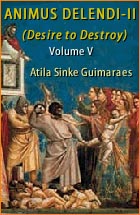 Volume V |
 Volume VI |
 Volume VII |
 Volume VIII |
 Volume IX |
 Volume X |
 Volume XI |
 Special Edition |


